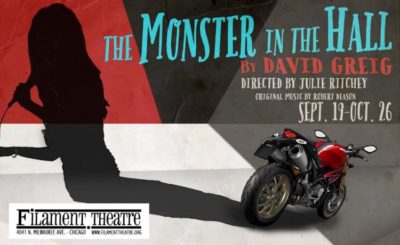The Monster in the Hall
Directed by Julie Ritchey
Composer: Robert Deason
Choreographer: Mara Dale
At Filament Theatre
A story of pain and humiliation told through Tetris noises
Filament Theatre’s latest production is the manic, uproarious, fourth wall-destroying story of Scottish teenager Duck Macatarsney’s (Lindsey Dorcus) struggle to care for her multiple sclerosis-stricken father. The Ducati Monster motorcycle Duck is named after has been lying in the hallway ever since her mother was killed while riding it, although as the doo-wop chorus helpfully explains, it is really a metaphor for our refusal to face our problems. Duck and her father, Duke (Andrew Marchetti), live in filth; he self-medicates with marijuana while she cleans up after him and writes a novel based on Harry Potter and Twilight with herself as the protagonist.
Soon, her counselor notices she is overwhelmed, and sends a social worker to inspect the Macatarsney household. Duck fears she will be separated from her father and plans to create a façade of normality. Unfortunately, the day of the inspector’s visit, Duke becomes blind as an effect of his MS. The family is then interrupted by Lawrence (Christian Libonati), a probably gay boy Duck has a crush on and whose cousin Duke owes for weed, and Agnetha (Molly Bunder), a Norwegian anarcho-feminist punk rocker who found Duke by tracing his IP address. They are still there when the inspector (also Bunder) arrives, and hijinks ensue.
 The play, which premiered in Scotland in 2010, originally included music by Nigel Dunn and Stephen Wright, but Filament credits its musical director Robert Deason as the composer. Perhaps the songs were adapted fresh for this cast, who perform them with gusto. Julie Ritchey’s directing and Mara Dale’s choreography keeps the young cast racing throughout the theatre and leaping over platforms, each other, and the piano on which they accompany themselves as they switch between roles. Only Dorcus plays a somewhat naturalistic character, the others alternate between their main and auxiliary characters, engage in direct address, and make sound effects.
The play, which premiered in Scotland in 2010, originally included music by Nigel Dunn and Stephen Wright, but Filament credits its musical director Robert Deason as the composer. Perhaps the songs were adapted fresh for this cast, who perform them with gusto. Julie Ritchey’s directing and Mara Dale’s choreography keeps the young cast racing throughout the theatre and leaping over platforms, each other, and the piano on which they accompany themselves as they switch between roles. Only Dorcus plays a somewhat naturalistic character, the others alternate between their main and auxiliary characters, engage in direct address, and make sound effects.
 The show opens with a prologue explaining the basic situation, and the first few scenes proceed nonlinearly. However, this time-bending aspect is dropped once the exposition is out of the way, except for a flash-back to a video game which is one of the show’s funniest moments. Not that MS, grief, or being a teenage caregiver are played completely for laughs. Duke knows that he and Duck are not coping well, and Duck is in denial. He asks what the audience is thinking: would intervention from social services really be a bad thing? Playing these characters allows Dorcus and Marchetti to show their sides as serious actors, but prevents them from engaging in quite as many acrobatics as Libonati and Bunder. Dorcus is fully capable of carrying Duck’s pain, stubbornness, and deluded optimism. Her physicality is as strong as the chorus’s, and is key to the chase at the plot’s climax. But the other actors’ clowning is the most distinctive part of the show, and I especially loved Libonati’s vocal effects. Certainly I found myself grinning and laughing during this show far more often than feeling pity or fear.
The show opens with a prologue explaining the basic situation, and the first few scenes proceed nonlinearly. However, this time-bending aspect is dropped once the exposition is out of the way, except for a flash-back to a video game which is one of the show’s funniest moments. Not that MS, grief, or being a teenage caregiver are played completely for laughs. Duke knows that he and Duck are not coping well, and Duck is in denial. He asks what the audience is thinking: would intervention from social services really be a bad thing? Playing these characters allows Dorcus and Marchetti to show their sides as serious actors, but prevents them from engaging in quite as many acrobatics as Libonati and Bunder. Dorcus is fully capable of carrying Duck’s pain, stubbornness, and deluded optimism. Her physicality is as strong as the chorus’s, and is key to the chase at the plot’s climax. But the other actors’ clowning is the most distinctive part of the show, and I especially loved Libonati’s vocal effects. Certainly I found myself grinning and laughing during this show far more often than feeling pity or fear.
Eleanor Kahn’s set design is a multilevel conglomeration of flats that create an obstacle course, but it takes a beating itself. Doors are created by microphone stands, a clever solution consistent with the show’s highly imaginative yet minimalist aesthetic. Those microphones are helpful during the songs, but I wanted them to be stronger. The Scottish accents aren’t overwhelming, but there are a lot of Britishisms. The audience sits scattered around the thrust stage at small tables on which they can place their own refreshments, since Filament’s concession stand doesn’t exist yet. I wish their venue wasn’t so far from college campuses, because I think a young, slightly refreshed crowd would be the ideal audience for this show. Not that older people won’t like it, just that the actors jump very close to the audience and the content isn’t really as grim as some promotional materials made it sound. If you go, expect to laugh and be excited with some pathos mixed in.
Recommended
Jacob Davis
Date Reviewed: September 21st
For more info checkout The Monster in the Hall page at theatreinchicago.com
At Filament Theatre, 4041 N. Milwaukee, Chicago, IL, (773) 270-1660, www.filamenttheatre.org, tickets $14 – $20, Fridays and Saturdays at 8 pm, Sundays at 3pm, running time is 95 minutes without intermission, through October 26, 2014


